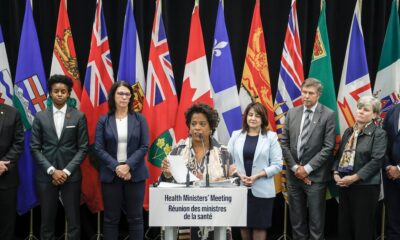Top Stories
Urgent Concerns Over Canada’s Drug Policies and Long-COVID Clinics

UPDATE: Urgent discussions are underway regarding Canada’s handling of fentanyl exports and long-COVID clinics as critical letters raise significant concerns. The issues were highlighted in recent letters to the editor, prompting immediate attention from government officials and the public.
In a notable letter, concerns were voiced about former U.S. President Donald Trump‘s claims that Canada is failing to control fentanyl exports. Critics argue that Trump’s administration misrepresents the situation, stating that only trace amounts of fentanyl flow into the U.S. from Canada, primarily sourced from other countries. This misrepresentation serves to unjustly justify tariffs, according to the letter writer.
Furthermore, Canadian fentanyl czar Kevin Brosseau recently spoke out against these allegations, emphasizing that Canada has strengthened border security. This ongoing narrative is seen as an attempt to deflect responsibility for the ongoing U.S. drug crisis.
On a related note, the British Columbia government is facing backlash for their plan to cut payments for long-COVID clinics, effective September 1, 2025. This decision could leave thousands of patients without vital care. Advocates argue that the complexity of long-COVID, Myalgic Encephalomyelitis, and Chronic Fatigue Syndrome requires specialized treatment that is not adequately addressed by traditional group models.
One patient’s sister, who has struggled with ME/CFS for over a decade, highlighted that options for care are already limited. She expressed deep concern over the potential impact of the government’s cuts, stating, “This will drastically reduce the quality of life for thousands of disabled patients.”
Another letter criticized Prime Minister Justin Trudeau for spending practices, specifically pointing out the $52 billion given to auto companies for battery production, which critics claim will never be repaid. This sentiment echoes a broader frustration with government spending amidst rising national debt and homelessness.
These letters reflect a growing urgency among Canadians regarding government accountability in both drug policy and healthcare provision. As the situation develops, citizens are encouraged to voice their opinions to ensure their concerns are heard.
“What happens next could set the tone for governmental responsibility in addressing both the opioid crisis and the ongoing healthcare needs of long COVID patients,” remarked one public health official.
As discussions unfold, stakeholders are urged to engage in dialogue to advocate for the needs of Canadians affected by these critical issues. The outcomes could significantly impact public health and economic stability in the region.
For those who wish to express their views, letters can be submitted to the Times Colonist. The urgency of these matters cannot be overstated, as the implications affect the lives of many Canadians.
-

 World3 months ago
World3 months agoScientists Unearth Ancient Antarctic Ice to Unlock Climate Secrets
-

 Entertainment3 months ago
Entertainment3 months agoTrump and McCormick to Announce $70 Billion Energy Investments
-

 Science3 months ago
Science3 months agoFour Astronauts Return to Earth After International Space Station Mission
-

 Lifestyle3 months ago
Lifestyle3 months agoTransLink Launches Food Truck Program to Boost Revenue in Vancouver
-

 Technology2 months ago
Technology2 months agoApple Notes Enhances Functionality with Markdown Support in macOS 26
-

 Top Stories1 week ago
Top Stories1 week agoUrgent Update: Fatal Crash on Highway 99 Claims Life of Pitt Meadows Man
-

 Sports3 months ago
Sports3 months agoSearch Underway for Missing Hunter Amid Hokkaido Bear Emergency
-

 Politics2 months ago
Politics2 months agoUkrainian Tennis Star Elina Svitolina Faces Death Threats Online
-

 Technology3 months ago
Technology3 months agoFrosthaven Launches Early Access on July 31, 2025
-

 Politics3 months ago
Politics3 months agoCarney Engages First Nations Leaders at Development Law Summit
-

 Entertainment3 months ago
Entertainment3 months agoCalgary Theatre Troupe Revives Magic at Winnipeg Fringe Festival
-

 Politics1 week ago
Politics1 week agoShutdown Reflects Democratic Struggles Amid Economic Concerns





















